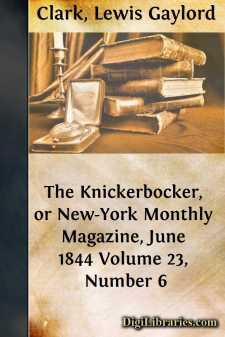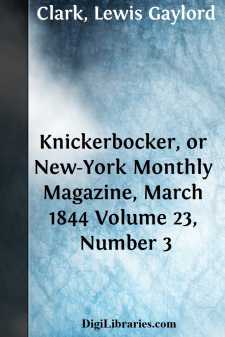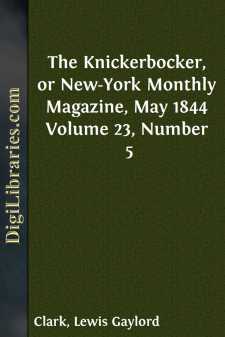Categories
- Antiques & Collectibles 13
- Architecture 36
- Art 48
- Bibles 22
- Biography & Autobiography 813
- Body, Mind & Spirit 142
- Business & Economics 28
- Children's Books 15
- Children's Fiction 12
- Computers 4
- Cooking 94
- Crafts & Hobbies 4
- Drama 346
- Education 46
- Family & Relationships 57
- Fiction 11828
- Games 19
- Gardening 17
- Health & Fitness 34
- History 1377
- House & Home 1
- Humor 147
- Juvenile Fiction 1873
- Juvenile Nonfiction 202
- Language Arts & Disciplines 88
- Law 16
- Literary Collections 686
- Literary Criticism 179
- Mathematics 13
- Medical 41
- Music 40
- Nature 179
- Non-Classifiable 1768
- Performing Arts 7
- Periodicals 1453
- Philosophy 64
- Photography 2
- Poetry 896
- Political Science 203
- Psychology 42
- Reference 154
- Religion 513
- Science 126
- Self-Help 84
- Social Science 81
- Sports & Recreation 34
- Study Aids 3
- Technology & Engineering 59
- Transportation 23
- Travel 463
- True Crime 29
The Knickerbocker, or New-York Monthly Magazine, June 1844 Volume 23, Number 6
Description:
Excerpt
THE PLAGUE AT CONSTANTINOPLE.
BY AN EYE-WITNESS.
In 1837 I was a resident in Galata, one of the faubourgs of Constantinople, sufficiently near the scenes of death caused by the ravages of the plague to be thoroughly acquainted with them, and yet to be separated from the Turkish part of the population of that immense city. It is not material to the present sketch to dwell upon the subject of my previous life, or the causes which had induced me to visit the capital of the East at such a period of mortality; and I will therefore only add, that circumstances of a peculiarly painful nature obliged me to locate myself in Galata, where there were none to sympathize in my feelings, or any one with whom I could even exchange more than a word of conversation. I saw none but the widowed owner of the house in which I had a chamber, her daughter Aleukâ, and Petraki, her little son.
While the epidemic raged, we four endeavored to keep up a rigid quarantine. Each recommended to the other the strictest observance of our mutual agreement not to receive any thing from without doors, except the necessaries of life; and whenever we left the house, which was to be as seldom as possible, not to come in contact with any one. Whenever I went out I invariably wore an oil-cloth cloak, and by the aid of my cane prevented the dogs of the streets, which are there so numerous, from rubbing against me. If I visited any one, which I seldom did, I always sat on a bench or chair to prevent conveying or receiving contagion; and before even entering the house, I always underwent the preparation of being smoked in a box, which during the prevalence of the plague is placed near its entrance for that purpose. These boxes were some eight feet high by three square, the platform on which the feet rested elevated about a foot above the earth, so as to admit under it a dish containing the ingredients of the prophylactic, and a hole in the door to let the face out during the smoking of the clothes and body. We procured our daily supply of provisions from a Bak-kal, a retail grocer, whose shop was directly under our front window; an itinerant Ekmekjer, or bread-man, brought our bread to the door; our vegetables were procured from a gardener close by, and our water we drew from a cistern under the house: in fine, our food was either smoked or saturated before we touched it, and every possible precaution observed to cut our little family off from the dreadful scourge, ‘the pestilence which walketh in darkness and the destruction which wasteth at noon day.’ The mother and daughter throughout the day spun silk, knitted woolen suits, or embroidered kerchiefs for head dresses, called in Romaic fakiolee, and even to a late hour of the night they frequently continued the same employment, until the plague prevented the sale of their handiwork, and their materials were all used up. All day long they would sit upon the sofa of their little apartment, facing the street, and while their hands toiled for a subsistence, the widow’s daughter hummed a plaintive air, or occasionally broke the silence by conversing with her mother....




